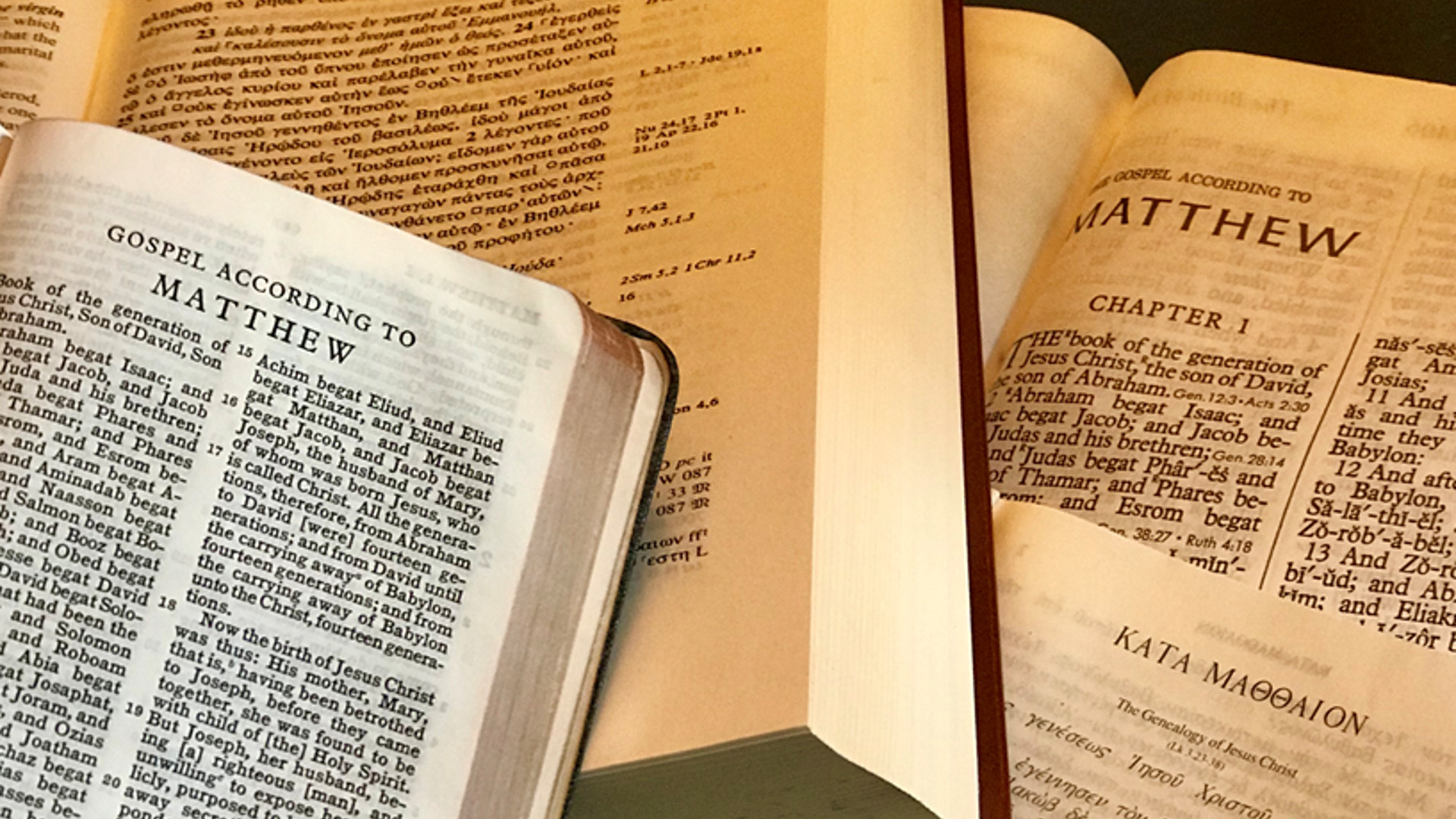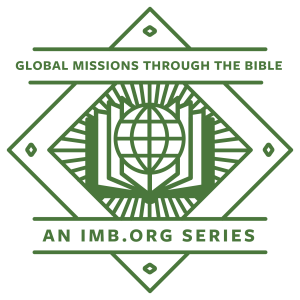
 Editor’s Note: The history of missions is replete with examples of God using his Word to call his followers to engage in his redemptive work around the world by praying, giving, going, and sending. The aim of this article series (part one here) is to help Bible students, teachers, and readers recognize the theme of global missions throughout Scripture. In this installment, Dr. Charles Quarles, research professor of New Testament and biblical theology at Southeastern Baptist Theological Seminary, examines principles pertaining to global missions from the gospel of Matthew.
Editor’s Note: The history of missions is replete with examples of God using his Word to call his followers to engage in his redemptive work around the world by praying, giving, going, and sending. The aim of this article series (part one here) is to help Bible students, teachers, and readers recognize the theme of global missions throughout Scripture. In this installment, Dr. Charles Quarles, research professor of New Testament and biblical theology at Southeastern Baptist Theological Seminary, examines principles pertaining to global missions from the gospel of Matthew.
Among the New Testament books emphasizing God’s heart for the nations, Matthew’s gospel holds a significant place. It depicts the life and ministry of the ultimate missionary, Jesus, who crossed impossible barriers to seek and save the lost. Matthew’s gospel also consistently shows the inclusion of Gentile outsiders throughout Jesus’s life, ministry, death, and resurrection.
“This first book of the New Testament—from the very first verse to the very last—underscores God’s purpose to bring salvation to every tribe, tongue, and nation of the earth.”
Jesus: The Son of One Whose Seed Would Bless the Nations
The short verse that begins the book of Matthew emphasizes Jesus’s identity as the Messiah, the promised descendant of David who would reign over God’s people forever. Matthew was also careful to describe Jesus as the “son of Abraham,” knowing that some of his readers would have conceived of the Messiah as a ruler whose reign would benefit the people of Israel alone and only spell disaster for the pagan nations.
By identifying Jesus as the son of Abraham, Matthew did not mean that Jesus was merely some ordinary Israelite. No, he identified Jesus as the special descendant of Abraham who would fulfill the promise of Genesis 22:18 and 26:4, the offspring through whom all the nations on earth would be blessed.
Jesus’s Lineage Included Gentiles
Matthew also emphasized God’s inclusion of the Gentiles in his plan by highlighting the presence of four Gentile women—Tamar, Rahab, Ruth, and Bathsheba (Matt. 1:3, 5, 6)—in the genealogy of Jesus. Ancient Jewish texts describe Tamar as a “foreigner.” Rahab was a Canaanite (Josh. 2:8–24). Ruth was a Moabite (Ruth 1:4).
Matthew did not identify Bathsheba by name but described her as the wife of Uriah in order to emphasize her association with her Hittite husband. These four Gentile women in the Messiah’s line hint that Jesus was born to be the Savior of people from many nations.
Gentiles Worshiped Jesus at His Birth
Strikingly, the first people to worship Jesus in Matthew were not Israel’s leaders—the chief priests and elders—though they were aware of the Messiah’s birth (Matt. 2:4). Rather, some of the first worshipers were representatives of the pagan Gentile world—the magi.
The revelation of Christ’s coming through the star of Bethlehem was also significant. God announced the Messiah’s birth in the heavens where people of every nation and language could read and understand (Psa. 19:1–4). He summoned Gentile leaders to worship the infant Christ, thus, displaying both his love for all the peoples of the world and his desire to bring salvation to the ends of the earth.
Jesus Ministered to Gentiles
Beginning in Matthew 4 and throughout the rest of the book, Jesus repeatedly extended his ministry beyond the Jewish people to those of other ethnicities. Matthew quoted Isaiah 9:1–2 to show that by establishing his ministry headquarters in Capernaum, Jesus brought light to “Galilee of the Gentiles” (Matt. 4:15–16). In Matthew 4:4 and Matthew 4:25, Jesus healed people from as far away as Syria. Additionally, large crowds from the Decapolis—a Gentile territory—followed him.
In Matthew 8:5–13, Jesus showed his willingness to defy Jewish taboos by entering the home of a Gentile. He exclaimed that the faith of a Gentile man surpassed that of any Israelite. He promised that people from all over the world would enter his kingdom and share in the great Messianic feast with the patriarchs of Israel.
Matthew’s gospel contains numerous references to the Old Testament that spoke of God’s heart for all nations. Matthew’s lengthiest quotation from the Old Testament (Matt. 12:15–21 HCSB) ended with the promise: “The nations will put their hope in his name,” highlighting Jesus’s purpose to bring hope to people of every nation.
An example of this from Jesus’s ministry is found in Matthew 15:21–28, where Jesus was compassionate to a Canaanite woman—a descendant of the archenemies of the Israelites in the Old Testament. This account demonstrates how far Jesus extended his ministry. It went beyond the borders of Judea and Galilee to regions like Tyre and Sidon and even to those most despised by Israel.
Gentiles Worshiped Jesus at His Death
Just as Gentiles from foreign lands worshiped Jesus at his birth, they also worshiped him at his death. Although the Roman soldiers taunted and tortured Jesus in the final hours before his death, the miracles that occurred during Jesus’s hours of suffering on the cross prompted the Roman centurion who supervised the crucifixion to exclaim, “Truly this was the Son of God!” (Matt. 27:54 ESV)
Matthew included a detail that Mark and Luke did not mention. Matthew noted that the Roman soldiers who served under the centurion and assisted with Jesus’s crucifixion also shared the centurion’s astonishment at the supernatural events that surrounding the crucifixion. They joined with the centurion in his confession of Jesus as God’s son. This tiny detail—that Jesus died to a chorus of Gentiles exclaiming his deity—dispels any doubt that Christ came to include even those outsiders whose hands were the very instruments of his death.
The fact that Jesus died to a chorus of Gentiles exclaiming his deity dispels any doubt that Christ came to include even those outsiders whose hands were the very instruments of his death.
Some have wrongly assumed that texts like Matthew 10:5–6 indicate that Jesus was only concerned about the salvation of the Jews. But Jesus wanted his disciples to proclaim the gospel to everyone. While Jesus’s disciples may have initially focused their mission on the Israelites per Jesus’s instructions, that was only the first phase of his ministry. It later extended to all peoples, just as the mission to “the end of the earth” in Acts 1:8 began with ministry in Jerusalem and Judea and then extended to the uttermost parts of the earth.
After Rising from the Dead, Jesus Commanded Worldwide Disciple Making
Two important texts in Matthew’s gospel make Jesus’s desire for worldwide disciple making indisputable. First, in Matthew 24:14 Jesus prophesied: “This good news of the kingdom will be proclaimed in all the world as a testimony to all nations, and then the end will come” (ESV). The phrases “all the world” and “all nations” give dual emphasis to the importance of proclaiming the gospel to all peoples, without exception.
Secondly, the passage known as the Great Commission stands at the climax of this missionary gospel. Jesus commanded: “Go therefore and make disciples of all nations” (Matt. 28:18–20 ESV). Such a conclusion is fitting for this gospel that pulses so strongly with God’s heart of compassion. This first book of the New Testament—from the very first verse to the very last—underscores God’s purpose to bring salvation to every tribe, tongue, and nation of the earth.
Dr. Charles Quarles is research professor of New Testament and biblical theology at Southeastern Baptist Theological Seminary. He has written several books on the gospel of Matthew including A Theology of Matthew, The Sermon on the Mount, and Matthew (in the Exegetical Guide to the Greek New Testament series). He and his wife, Julie, are former IMB missionaries and have three adult children and two grandchildren.

